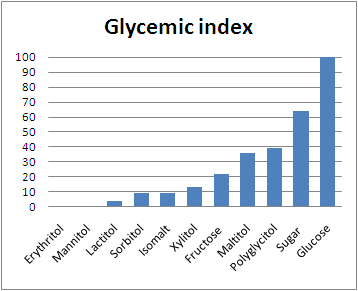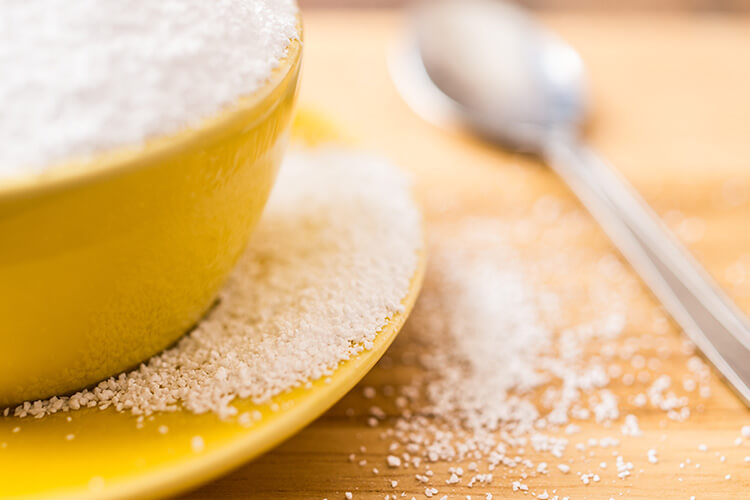Blog
What are sugar alcohols?
There are various sweeteners on the market, some added sugars, some artificial sweeteners, some naturally sweetened with spices or whole fruit. But what about sugar alcohols? What are they, and are they something to watch out for?
What are sugar alcohols?
Also known as sugar replacers or polyols, sugar alcohols are a combination of sugar and alcohol at a molecular level. The alcohol is not ethanol (like the stuff in your vodka or wine) and sugar alcohols occur naturally in whole foods like veg and fruit.
When used commercially, they are chemically processed from foods containing starch, glucose or sucrose to form a crystallised product that can be added to packaged goods as a sweetener and to add texture and bulk,1 such as in ‘sugar-free’ biscuits and gum.
Common sugar alcohols include:
- Erythritol
- Isomalt
- Lactitol
- Maltitol
- Mannitol
- Sorbitol
- Xylitol
Health concerns
Sugar alcohols can still be considered a form of carbohydrate as some, though not all, have an effect on your blood glucose levels (though not as dramatically as common added sugars like sugar, syrups and fruit juice).2
Of these, maltitol appears to have the greatest impact on blood glucose, though it and all other sugar alcohols are lower on the glycaemic index than 100% glucose, if they produce an effect at all (see below).

So, while a little sugar alcohol sweetener can be okay when weaning oneself off of a high added sugar diet, too much can cause a laxative effect. Why?
Well, our body doesn’t completely metabolise sugar alcohols (and when it does, it is slow!). The unmetabolised sugar alcohols move through the digestive tract to eventually reach the gut bugs of the large intestine, who get to fermenting them.1;3
Though regardless of whether they are metabolised or not, sugar alcohols can also create an osmotic effect, bringing fluid into the bowels.
It is these reactions that can result in gastrointestinal disturbances, such as bloating and diarrhoea, especially when consumed in excess.
Of all the sugar alcohols, this is less likely for erythritol, much of which can be absorbed in the small intestine before reaching the gut bugs. Erythritol may be a favourite among the sugar alcohol clan, as it has minimal impact on the body overall, and is reported to not cause tooth decay.4
However, if you are on a low FODMAP protocol, depending on your level of tolerance you may need to limit intake of sugar alcohols.5
But keep in mind, all sugar alcohols are highly refined, offering no nutritional value, having undergone a great deal of processing to become a single ingredient, far removed from their naturally occurring sources.
Sweeten naturally
While a little on occasion is fine, we don’t want to rely on such sweeteners regularly. Ultimately, we want our palate to adjust and become more sensitive to the subtle sweetness that occurs naturally in spices and whole foods, such as cinnamon and vanilla, fruit, some veg such as sweet potato, or a little dried fruit.
All such ingredients can be used to sweeten baked goods or sweet treats, like our Nutty Banana Bread Balls, while offering some health benefits and nutrition to boot 😉
By Angela Johnson (BHSc Nut. Med)
References:
- FDA n.d., Sugar Alcohols, viewed 30 October 2017, <https://www.accessdata.fda.gov/scripts/InteractiveNutritionFactsLabel/sugar-alcohol.html>
- UCSF n.d., Counting Sugar Alcohols, viewed 30 October 2017, <https://dtc.ucsf.edu/living-with-diabetes/diet-and-nutrition/understanding-carbohydrates/counting-carbohydrates/learning-to-read-labels/counting-sugar-alcohols/>
- International Starch Institute n.d., Sorbitol and other polyols, viewed 30 October 2017, <http://www.starch.dk/isi/glucose/polyol.asp>
- Grembecka, M 2015, ‘Sugar alcohols–their role in the modern world of sweeteners: a review’, European Food Research & Technology, no. 1, p. 1.
- Monash University, What are polyols?, viewed 30 October 2017, <https://www.monashfodmap.com/blog/what-are-polyols/>












